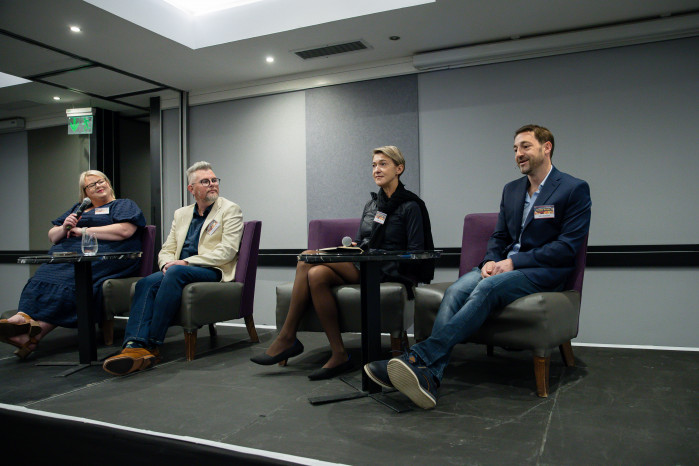News
A Collection Of Restaurant, Food, Drink And Hospitality News From All Over South Africa
Key Takeouts from the 2025 Hospitality Industry Think Tank
24 September 2025
South Africa’s tourism industry needs to position itself for stronger, more sustainable growth ahead of 2026, a year expected to bring intensified global competition, shifting travel trends and new opportunities in emerging markets.
This was the key take out of the 2025 Hospitality Industry Think Tank in Johannesburg, held in aid of Touching Dreams, and facilitated by hospitality veteran Chris Godenir. The event brought together tourism leaders, policy makers and operators from across the country to chart a path forward. The consensus was clear that moving beyond entrenched habits and taking coordinated action now is critical to unlocking growth, jobs and competitiveness.
Here are six priorities highlighted during the event:
1. Diversify beyond Cape Town and Kruger
Cape Town and the Kruger National Park remain iconic, but the over-reliance on these two destinations leaves much of the country’s tourism potential untapped. Industry leaders called for bundled regional products that give travellers reasons to explore more.
“We need to create bundled regional products that add value and keep visitors in the country longer. Bush, berg, beach, gastronomy, adventure, not just the Big Five and Table Mountain,” said David Frost, SATSA CEO. This, he added, requires collaboration between local operators, provincial tourism bodies and airlines to align marketing and booking channels.
2. Embed sustainability in operations, not just marketing
Sustainability must move from a talking point to an operating principle. Delegates stressed that environmental and social responsibility must be built into staff training, procurement decisions and daily routines. Guests quickly notice when the values promoted online are not reflected in service delivery.
Chris Godenir, who has championed sustainability for over a decade at the Peninsula All-Suite Hotel, noted “sustainability is not a campaign, it’s cultural. When staff live it every day, from reducing waste to supporting local suppliers, guests feel the authenticity and community’s benefit.’
For younger travellers and potential employees, authenticity in sustainability is increasingly a deciding factor.
3. Build a shared industry skills pipeline
The sector’s ability to create large-scale employment is being hampered by slow and complex SETA grant processes. Panellists called for an industry-owned training initiative that could centralise resources, create a standard curriculum and deploy training where it is most needed.
By pooling funding and capacity, operators can equip young people with transferable skills, from front-of-house service to back-office operations, that strengthen the workforce and the communities around tourism assets.
Building a future-ready workforce also means addressing transformation beyond compliance. Several delegates noted that aiming for 51% black ownership for the sole purpose of meeting BEE requirements is not enough if that ownership does not come with decision-making power and meaningful participation.
Real empowerment requires pathways for black entrepreneurs to own and operate tourism assets, coupled with mentorship, procurement opportunities and long-term partnerships.
4. Use AI to enhance, not replace, human hospitality
Artificial intelligence and automation are already improving booking processes, guest communications and revenue management. The opportunity lies in using these tools to remove repetitive tasks so staff can focus on personalising the guest experience.
Natalia Rosa, founder and CEO of Big Ambitions, said, “AI is not about replacing people, but freeing them up to be more human. If we get it right, the technology will give guests more of what they want, which is genuine connection.”
For AI to add real value, businesses must capture and share institutional knowledge rather than allow it to remain with a few individuals.
5. Push for visa reform in key growth markets
Simplifying the entry process for high-potential source markets like India and China could bring significant visitor growth. Measures such as e-visas, visas-on-arrival and faster processing times were highlighted as achievable policy changes. With millions of outbound travellers from these markets seeking new destinations, South Africa could see a substantial uplift in arrivals if barriers to entry are reduced.
6. Maximise impact with cost-effective marketing
Hosting micro-influencers, organising creator-led familiarisation trips and using short-form video platforms like TikTok allow for high visibility with minimal spend.
“We must tell the story of South Africa in a way that makes people want to stay longer. You might come for the safari, but you stay for the beaches, the culture, the food. That’s how we grow the value of each visitor,” said Olivier Perillat-Piratoine, MD at Club Med Southern Africa.
Chris Snyman, Chief Development Officer at Dream Hotels & Resorts, which was a main sponsor of the Think Tank summed up the event’s urgency:
“Diversifying our destination offer, embedding sustainability, fixing the skills pipeline, embracing AI, pushing for visa reform and marketing smarter are all within our reach. We cannot wait for policy changes or perfect conditions, we must start now, so that by 2026 South Africa is stronger, more competitive and more resilient.”
With coordinated action from both public and private stakeholders, South Africa’s tourism industry can move from potential to performance.
Strolla Restaurant
Sea Point, Western Cape Breakfast, Burgers, Cocktails, Continental, Grills, Light Meals, Pizza, Seafood, Sushi, Vegetarian
Located off Sea Point’s bustling promenade, alongside the Peninsula All-Suite Hotel, Strolla offers a fresh and funky local hangout for on-the-go coffee, simple yet sophisticated food and sus...











